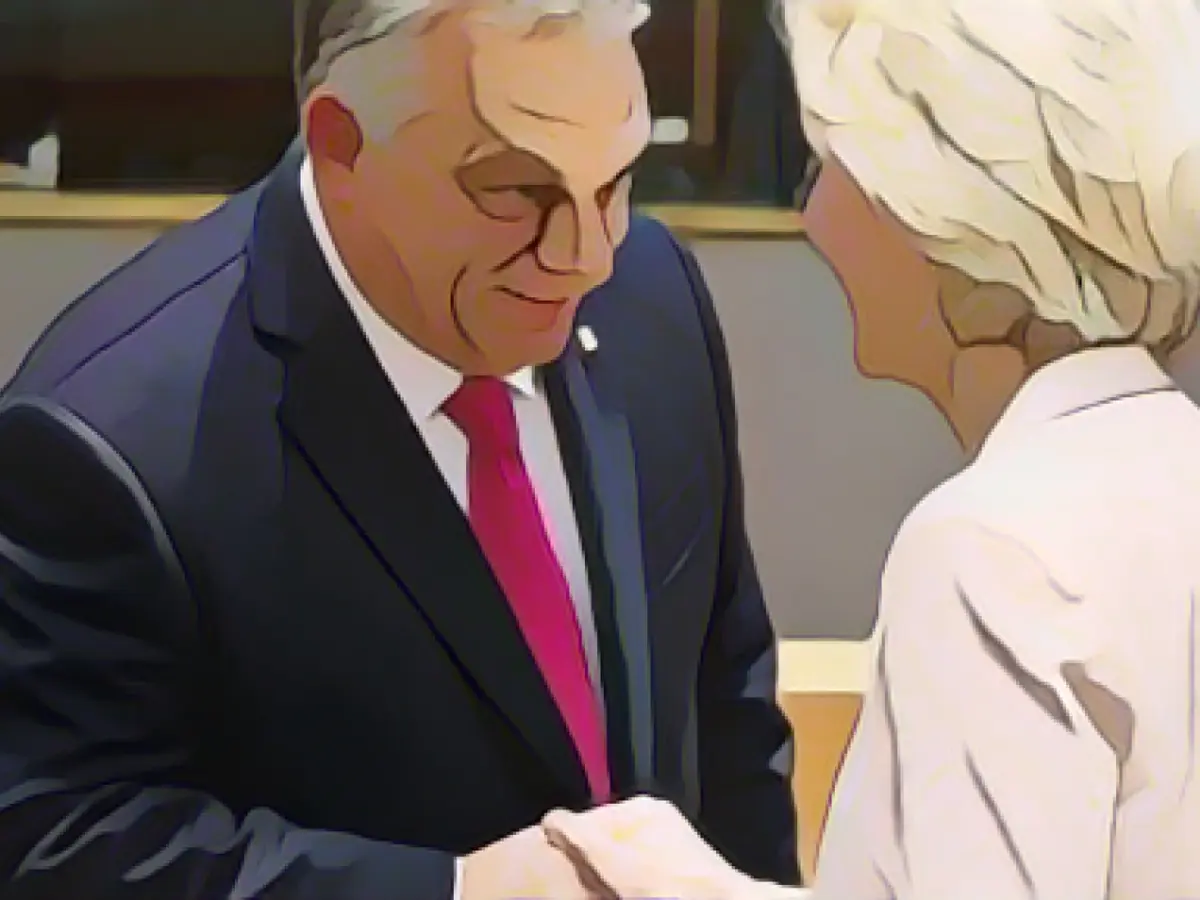Criticism of von der Leyen: EU Commission releases ten billion euros for Hungary
From Thursday, the pre-Christmas summit of European heads of state and government will discuss further billions in aid for Ukraine and the start of accession talks with Kiev. However, Orban has so far blocked the plans. Critics accuse the right-wing populist of "blackmail" because he has also demanded money back from the EU.
The Commission has now declared that Hungary has implemented the required measures for the independence of its judiciary. As a result, regional funding is "no longer blocked" and Hungary can "claim reimbursements of up to around 10.2 billion euros". This is almost half of the 21.7 billion euros that the EU froze in the dispute with Orban. "Better late than never", cheered Hungary's European Affairs Minister Janos Boka on Facebook.
There was sharp criticism from all parties in the European Parliament: MEP Daniel Freund (Greens) spoke of a "catastrophic signal". Von der Leyen is paying "the biggest bribe in EU history to the autocrat and Putin friend Viktor Orban", Freund wrote on the short message service X, formerly Twitter.
FDP MEP Moritz Körner wrote that von der Leyen was sacrificing democracy in Hungary to save democracy in Ukraine. "So far, Hungary has only delivered reforms on paper, and even that is not enough." According to a parliamentary report, the irregularly appointed President of the Supreme Court in Hungary will remain in office, possibly for life.
"The Commission could not have released the funds at a worse time," criticized CSU politician Monika Hohlmeier, who chairs the Budgetary Control Committee in the European Parliament. It should be clear to everyone that the ten billion euros ended up in the hands of Orban's confidants in his Fidesz party and oligarchs loyal to the government.
The large political groups in the EU Parliament had tried unsuccessfully to dissuade von der Leyen from the decision. In a speech in Strasbourg, however, she made it clear that the planned 50 billion euros in aid for Ukraine was her priority.
The Commission alone decides on the release of funds for Hungary; the member states can no longer prevent this. So far, the EU member states have refrained from criticizing von der Leyen, even if some diplomats have accused her of "bad timing".
Luxembourg was an exception. Foreign Minister Xavier Bettel had previously warned that if Hungary lifted its veto and received so much money in return, it would look like a "deal" that would certainly not strengthen citizens' trust in Europe. "That doesn't smell good," Bettel emphasized. German government circles, on the other hand, said that von der Leyen enjoyed Berlin's "fullest confidence".
Belgium's head of government Alexander de Croo criticized Orban: "This is not a Hungarian bazaar where everything can be traded," he said in Brussels.
Last year, the EU initiated rule of law proceedings against Hungary for the first time on suspicion of misappropriation of European budget funds and put further billions on hold. Budapest is also at loggerheads with Brussels over other violations of fundamental rights, such as the rights of asylum seekers, sexual minorities and academics.
Chancellor Olaf Scholz (SPD) addressed Hungary's resistance in his government statement on the EU summit in the Bundestag. According to his own words, he wants to make a strong case at the summit for both aid for Ukraine and accession negotiations with Kiev.
Read also:
- This will change in December
- German activists speak out in Dubai on suffering in Israel and the Gaza Strip
- Despite UN vote: fighting between Israel and Hamas in the Gaza Strip continues
- Nuclear fusion - hype or solution to energy problems?
- Despite the criticism towards Ursula von der Leyen for releasing ten billion euros to Hungary, EU leaders will discuss additional aid for Ukraine and potential accession talks with Kiev during their pre-Christmas summit.
- Viktor Orban, the Hungarian prime minister, has previously blocked these plans, but now that the EU Commission has deemed Hungary's judiciary independent, regional funding will no longer be blocked, allowing Hungary to claim up to 10.2 billion euros in reimbursements.
- This decision led to sharp criticism in the European Parliament, with Green MEP Daniel Freund calling it the "biggest bribe in EU history" to Orban, a "Putin friend."
- FDP MEP Moritz Körner argued that democracy in Hungary was being sacrificed to save democracy in Ukraine, yet Hungary had only delivered reforms on paper, and even these were not sufficient.
- Monika Hohlmeier, a CSU politician and Chair of the Budgetary Control Committee in the European Parliament, criticized the timing of the release of funds, believing they would end up in Orban's confidants' hands.
- The large political groups in the EU Parliament had unsuccessfully tried to dissuade von der Leyen from this decision, but she was clear that Ukraine aid was her priority.
- The Commission alone has the power to release funds for Hungary; member states no longer can prevent this, and accordingly, they have remained relatively quiet about the criticism towards leyen.
- Luxembourg, however, was an exception, with Foreign Minister Xavier Bettel warning that Hungary lifting its veto would only strengthen citizens' mistrust in Europe.
- German government circles expressed Berlin's fullest confidence in von der Leyen, while Belgium's head of government Alexander de Croo criticized Orban for creating a "Hungarian bazaar" where everything could be traded.
- Last year, the EU initiated rule of law proceedings against Hungary due to misappropriation of European budget funds and put further billions on hold.
- Budapest is also at odds with Brussels over violations of fundamental rights, such as the rights of asylum seekers, sexual minorities, and academics.
- Chancellor Olaf Scholz emphasized his desire to advocate for both Ukraine aid and accession negotiations with Kiev at the EU summit, regardless of Hungary's resistance.
Source: www.stern.de







